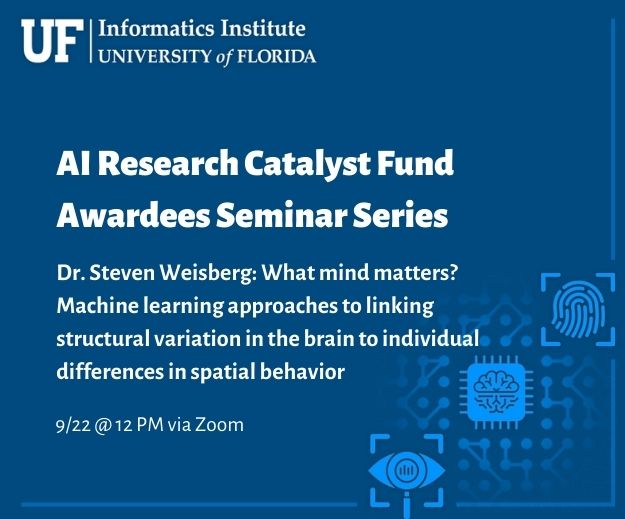AI Research Catalyst Fund Awardees Virtual Seminar Series – Dr. Steven Weisberg

- This event has passed.
AI Research Catalyst Fund Awardees Virtual Seminar Series – Dr. Steven Weisberg
September 22, 2021 @ 12:00 pm - 1:00 pm

AI Research Catalyst Fund Awardees Virtual Seminar Series
“What mind matters? Machine learning approaches to linking structural variation in the brain to individual differences in spatial behavior”
by Dr. Steven Weisberg
Assistant Professor in Department of Psychology
Wednesday, September 22, 2021
ABSTRACT:
A foundational challenge in understanding the human brain is how macroscopic neural structure can be associated with cognitive function. Exploiting advances in AI and machine-learning in this area, we propose a data-driven approach to close this gap. Spatial navigation is a widely-studied problem in this area, in part because spatial navigation varies drastically across people, despite being an essential task everyone must solve. A prominent hypothesis about the neural instantiation of spatial navigation is that the cognitive map is constructed by the hippocampus, a structure in the medial temporal lobe of the human brain. But evidence on whether hippocampal volume relates to variability in navigation behavior is mixed. Expert navigators and patients with lesions to or atrophy in the temporal lobes support the hypothesis, but two recent experiments with large sample sizes of healthy young adults do not. Here, we will apply a data-driven machine learning approach interrogating those datasets to 1) determine which regions of the brain covary with navigation ability and which structural properties of those regions that predict variability; and 2) create a pipeline for use with other structural MRI datasets for improved exploratory data analysis in neuroimaging. In the short-term, this research will provide evidence in favor (or against) the structure-function hypothesis – a critical question in human cognitive neuroscience. In the longer term, this research will promote the development of machine learning strategies that can be applied toward general cognitive traits, measured in different ways, across different populations. Such an approach could unlock exciting new avenues for disease diagnosis and prediction, new targets for clinical intervention, and new theories about brain-behavior associations.
Bio:
Steven Weisberg is an Assistant Professor of Psychology whose research focuses on the behavioral and neural underpinnings of spatial navigation in humans, young and old. After receiving his doctorate from Temple University and completing a post-doctoral fellowship at the University of Pennsylvania, Steven started the Spatial Cognition and Navigational Neuroscience (SCANN) lab at UF. By combining desktop and immersive VR with fMRI and machine learning, the SCANN Lab investigates the cognitive and neural mechanisms supporting effective spatial behavior in ecologically-relevant contexts.
Wednesday, September 22, 2021
12:00PM – 1:00PM
Via Zoom
RSVP below. Instructions to attend talk via Zoom will be emailed to you.


